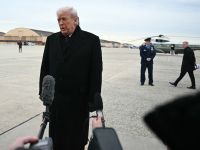Emirati President Sheikh Zayed bin Sultan al-Nahyan called Sunday for a system of regular Arab summits, when he met Saudi Crown Prince Abdullah bin Abdel Aziz, the official WAM agency reported.
"The Arab people want to see Arab summits held at which the leaders would together face up to their duties towards the Arab nation," he said.
"It is becoming essential to hold regular Arab summits, once or twice a year, because of the challenges currently facing us," he added, stressing that "the Arabs will carry no weight in the world if they do not work together."
Sheikh Zayed, and his Yemeni counterpart, Ali Abdullah Saleh, have repeatedly called for a summit to reconcile Arab countries, which have been divided since the 1990 Gulf War.
Only one Arab summit has been held since the 1991 war that ended Iraq's occupation. Iraqi President Saddam Hussein was not invited to that meeting in Cairo in 1996.
Saudi Arabia has said it would be prepared to attend such a summit if it were "well prepared."
The crown prince arrived in Abu Dhabi Sunday on the first leg of a tour of Gulf monarchies following the Muscat summit of the Gulf Cooperation Council (GCC) on Saturday that called for Iran to resolve its islands dispute with the United Arab Emirates through dialogue.
Sheikh Zayed and Crown Prince Abdullah discussed the results of that summit during their talks.
Prince Abdullah will visit Qatar on Monday, the official Saudi Press Agency reported.
The agency said the visit was in response to an invitation from Qatar's Emir Sheikh Hamad bin Khalifa al-Thani. It gave no further details.
Iran's Foreign Minister Kamal Kharrazi is also due to visit Qatar on Monday.
Leaders of the six-member Gulf Cooperation Council (GCC) comprising Saudi Arabia, the UAE, Oman, Qatar, Bahrain and Kuwait held a consultative summit in Oman on Saturday and discussed the GCC's ties to non-Arab neighbor Iran.
Ties between the GCC and Iran have been improving since moderate President Mohammad Khatami took office in 1997. But further improvement of relations has been hampered by the territorial dispute.
An official newspaper in Abu Dhabi said the GCC meeting "showed that its unity is so strong that it is difficult for any party to break or weaken it".
"Iran tried to break this cohesion by drawing closer to certain Arab countries of the Gulf under the cover of so-called 'security accords', about which it spread unfounded reports," Al-Ittihad daily said.
Abu Dhabi claims the three southern Gulf islands of Abu Musa and the Greater and Lesser Tunbs, which have been held by Tehran since 1971 and effectively control one of the world's major oil supply routes.
Iran has rejected the UAE's call that the issue should be referred to the International Court of Justice, saying they are part of Iranian territory.
Gulf leaders at their summit in the Omani capital "expressed the desire that the Iranian government cooperate to allow the (mediation) committee to realize its noble objective," GCC secretary general Jamil al-Hujeilan said.
The leaders of Bahrain, Kuwait, Oman, Qatar, Saudi Arabia and the UAE reviewed a report on the efforts of the GCC tripartite committee set up last July, comprising the Saudi, Omani and Qatari foreign ministers.
The GCC leaders, including Crown Prince Abdullah who represented Saudi Arabia in the absence of the ailing King Fahd, also called for "solid relations" with Iran – (Several Sources).
© 2000 Al Bawaba (www.albawaba.com)







